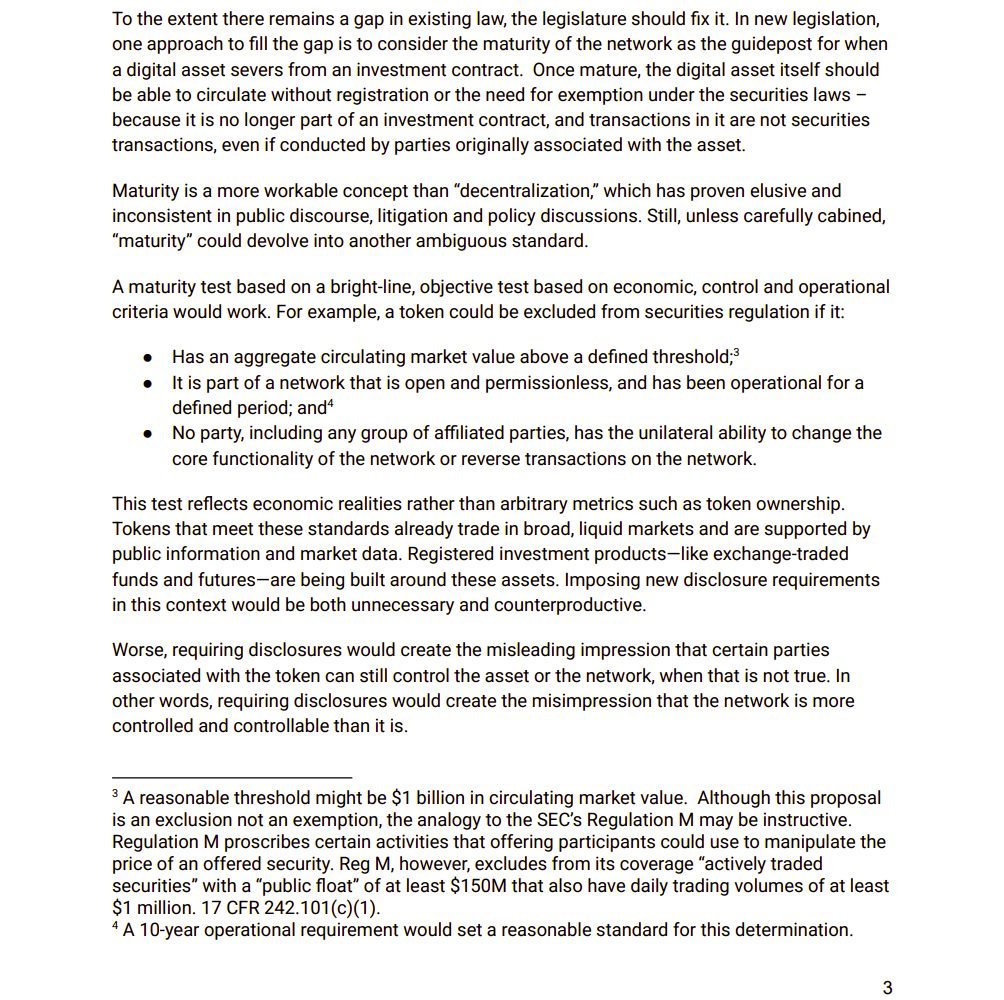Key Takeaways
- Ripple Labs proposed a ‘maturity test’ to determine when crypto tokens should no longer be considered securities.
- Criteria include a $1 billion market value threshold, 10-year operational network, and an open, permissionless structure.
Share this article
Ripple has proposed a new legislative framework to determine when crypto tokens should no longer be considered securities.
The company calls it a “network maturity” test, which would evaluate whether a token has outgrown its initial investment contract based on objective criteria such as market capitalization, operational history, and decentralization of control.
The proposal was outlined in a May 27 letter from Ripple’s legal team to the SEC’s Crypto Task Force, responding to the agency’s question about when a crypto asset, originally part of an investment contract, becomes legally distinct from that contract.
“In new legislation, one approach to fill the gap is to consider the maturity of the network as the guidepost for when a digital asset severs from an investment contract,” Ripple’s legal team noted.
“Once mature, the digital asset itself should be able to circulate without registration or the need for exemption under the securities laws – because it is no longer part of an investment contract, and transactions in it are not securities transactions, even if conducted by parties originally associated with the asset,” they added.
Currently, there is no bright-line rule under federal law for when a crypto token transitions from being part of a securities offering to being a freely tradable commodity or currency.
The SEC has historically floated concepts like “sufficient decentralization” to describe when a token might no longer be a security.
However, according to Ripple, this is too vague and subjective. The team has proposed the “network maturity” test as a clearer, more practical alternative to “decentralization.”
Under this approach, tokens could be excluded from securities regulation if they meet specific criteria, such as a high market capitalization, a long-operating, permissionless network, and the absence of any party with unilateral control over the protocol.
Ripple said that tokens meeting these standards already trade in broad, liquid markets with sufficient public information and market data. The company suggested a $1 billion circulating market value threshold and a 10-year operational requirement as reasonable benchmarks.


Token separation and safe harbor proposals
In addition to its legislative recommendation, Ripple has put forward a legal test to clarify when a crypto token sold as part of an investment contract should no longer be treated as one.
Under this framework, a token is presumed to have separated unless the issuer has left a material promise unfulfilled and the current holder has enforceable rights tied to that promise.
The test is designed to reduce ambiguity and prevent indefinite regulatory burdens on secondary market participants. It preserves the SEC’s enforcement authority in cases involving unfulfilled promises or bad-faith resale and allows for new investment contracts to be formed by downstream actors if warranted.
While acknowledging the SEC’s concerns about enforcement gaps, Ripple maintains that only Congress has the authority to establish new legal standards for crypto assets.
In the meantime, Ripple urges the SEC to interpret current law faithfully and refrain from expanding its regulatory reach beyond clearly defined legal boundaries. The team also supports the creation of a narrow, well-designed safe harbor to protect good-faith actors during early network development.
The letter follows an August court ruling in SEC v. Ripple Labs, in which Judge Analisa Torres held that XRP is not a security when traded on secondary markets.
The court, however, distinguished these transactions from Ripple’s earlier direct sales to institutional investors, which were deemed unregistered securities offerings.
Ripple hasn’t fully closed the book on its legal battle. Earlier this month, Judge Torres refused to approve the company’s proposed $125 million penalty deal with the SEC, keeping the case unresolved.
Share this article
